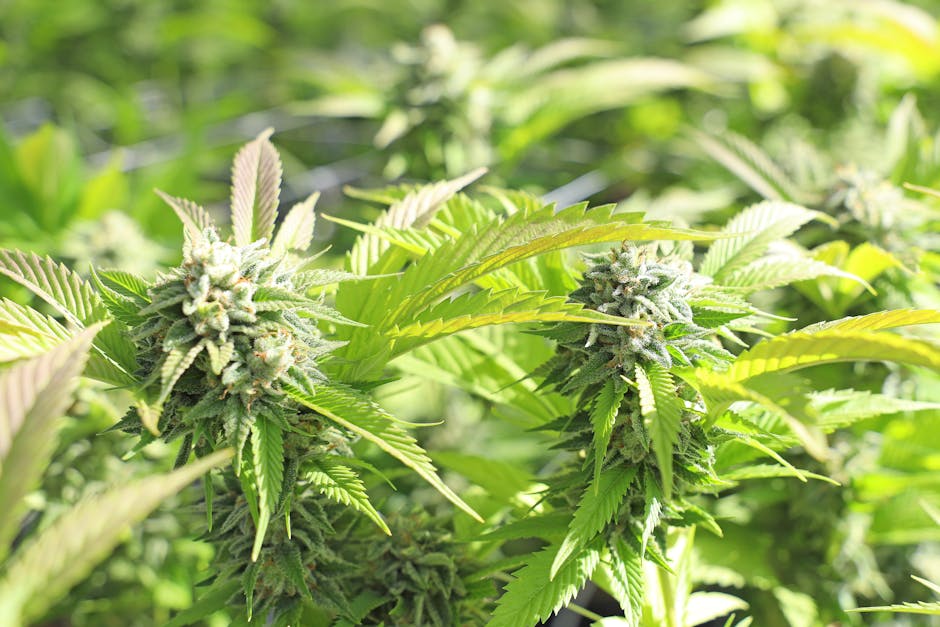THCA vs THC: What Sets Them Apart?
Posted on April 11 2025,

THCA vs THC are two important terms that often pop up in discussions about cannabis. Here's a quick breakdown:
-
THCA (tetrahydrocannabinolic acid) is non-psychoactive. It doesn't produce the "high" often associated with cannabis due to its larger molecular structure, which keeps it from binding to brain receptors.
-
THC (tetrahydrocannabinol) is psychoactive. It's the chemical responsible for the euphoric effects of cannabis, activated when heat converts THCA into THC.
Cannabis culture has evolved significantly over the years, branching out from its traditional roots into modern medicinal and recreational use. This shift wouldn't be possible without cannabinoids—the compounds in cannabis that deliver a wide range of effects. Among over 80 different cannabinoids, THCA and THC are key players in defining cannabis's role.
While THCA is the raw, non-psychoactive form prevalent in fresh cannabis, THC emerges as its heated counterpart, inducing the well-known euphoric and altering effects. Understanding the psychoactive properties of THC is crucial for anyone keen on exploring cannabis, be it for relaxation, medical benefits, or creative inspiration.

Chemical Composition and Conversion
THCA vs THC: Chemical Differences
THCA and THC might sound similar, but their chemical structures set them apart. THCA, or tetrahydrocannabinolic acid, is the natural form found in raw cannabis. Its structure includes a carboxylic acid group (COOH), making it a larger molecule. This extra group is the reason THCA doesn't cause a "high." It can't bind effectively to the brain's receptors due to its size.

On the other hand, THC—tetrahydrocannabinol—lacks this carboxylic acid group. This makes it smaller and able to fit perfectly into the brain's receptors, triggering the psychoactive effects cannabis is famous for.
Conversion Process
The change from THCA to THC is all about decarboxylation. This process involves removing the carboxylic acid group from THCA, turning it into THC. But how does this happen?
It's simple: heat, light, or time can cause decarboxylation. When you smoke or vape cannabis, the heat instantly converts THCA to THC. This is why you get high from smoking cannabis but not from eating it raw.
- Heat: Smoking or vaping provides the necessary temperature to convert THCA into THC almost instantly.
- Light: Over time, exposure to light can also trigger this conversion, but it's much slower than heat.
- Time: Simply letting cannabis sit can gradually convert THCA to THC, albeit at a very slow pace.
Understanding this conversion is key for anyone interested in cannabis, whether for recreational or medicinal use. Knowing how THCA turns into THC can help you choose the best consumption method for your needs.
Psychoactive Properties and Effects
THCA Effects
THCA is a game-changer for those seeking cannabis benefits without the "high." Unlike THC, THCA is non-psychoactive. This means it doesn't alter your mood or perception. Why? It all comes down to how it interacts—or rather, doesn't interact—with brain receptors.
THCA is too large to fit into the brain's CB1 receptors. These are the receptors that THC binds to, causing psychoactive effects. Because THCA can't bind well to these receptors, it won't make you feel euphoric or alter your perception.
But THCA isn't just a passive player. It offers potential health benefits that make it worth considering. It's believed to have anti-inflammatory properties, which can help reduce inflammation and pain. Some studies also suggest that THCA might be neuroprotective, potentially shielding brain cells from damage.
THC Effects
Now, let's talk about THC. This is the compound that gives cannabis its psychoactive reputation. When THC binds to the brain's CB1 receptors, it can change how you feel and think. This is what creates the sense of euphoria or "high" that many cannabis users seek.
THC doesn't just stop at making you feel good. It can also alter your perception. This means colors might seem brighter, sounds more vivid, and time may feel like it's moving differently. These altered perceptions are why some people use cannabis recreationally.
However, THC's effects aren't all fun and games. In some people, especially at high doses, it can lead to anxiety or paranoia. It's a bit of a balancing act. While it can help with pain relief and appetite stimulation, too much can lead to unwanted side effects.
Understanding these differences between THCA and THC can help you make informed choices about cannabis use. Whether you're looking for therapeutic benefits without the high or the full psychoactive experience, knowing what each compound offers is crucial.
Health Benefits and Therapeutic Potential
When it comes to THCA vs THC, both compounds offer unique health benefits, but they come with different effects and uses. Let's break down what each has to offer in terms of therapeutic potential.
THCA Benefits
Anti-inflammatory Properties
THCA is gaining attention for its potential anti-inflammatory effects. This could be beneficial for conditions like arthritis, where inflammation causes pain and discomfort. By reducing inflammation, THCA may offer a natural way to manage chronic pain.
Neuroprotective Effects
Research suggests that THCA might have neuroprotective properties. This means it could help protect brain cells from damage, potentially offering a new avenue for treating neurodegenerative diseases like Alzheimer's and Parkinson's. While human studies are limited, animal studies show promising results.
Anti-nausea and Antioxidant
THCA may also help reduce nausea, making it potentially useful for those undergoing chemotherapy or dealing with other conditions that cause nausea. Additionally, like other cannabinoids, THCA has antioxidant properties, which can help protect cells from oxidative stress and damage.
THC Benefits
Pain Relief and Appetite Stimulation
THC is well-known for its ability to provide pain relief. This makes it a popular choice for medical marijuana patients dealing with chronic pain. Additionally, THC can stimulate appetite, which is why it's often used by those who need to gain weight or have lost their appetite due to illness.
Anti-nausea Effects
Similar to THCA, THC also offers anti-nausea benefits. It's frequently used by cancer patients undergoing chemotherapy to help manage nausea and vomiting.
While both THCA and THC have their unique benefits, it's important to choose based on your specific needs and the effects you're looking for. Whether you're interested in non-psychoactive options or the full range of effects that THC offers, understanding these differences can guide your cannabis journey.
Consumption Methods and Legal Status
When considering THCA vs THC, the way you consume these cannabinoids can significantly affect your experience. Let's explore the different methods of consumption and the legal landscape surrounding them.
THCA Consumption
Raw Cannabis and Juicing
THCA is found in raw cannabis. To maintain its non-psychoactive properties, people often consume it raw. One popular method is juicing fresh cannabis leaves, which allows you to enjoy the potential health benefits without the high. This method is gaining popularity among those seeking a natural dietary supplement.
Dietary Supplements
For those who prefer a more convenient option, THCA is available in dietary supplements. These products often come in the form of capsules or tinctures and are designed to provide the benefits of THCA without any psychoactive effects. They are ideal for those looking to incorporate THCA into their daily routine easily.
THC Consumption
Smoking and Vaping
THC is commonly consumed through smoking or vaping. These methods involve heating cannabis to convert THCA into THC, resulting in immediate psychoactive effects. While popular, smoking can have negative effects on lung health, and vaping poses its own set of health concerns.
Edibles
For those who prefer not to inhale, edibles offer an alternative way to consume THC. These include products like brownies, gummies, and other baked goods. Edibles take longer to kick in—typically 30 minutes to 2 hours—but their effects last longer and can be more intense.
Legal Considerations
Navigating the legal landscape of cannabis can be tricky. In the U.S., cannabis legality varies widely:
- Federal Regulations: Under federal law, THC is classified as a Schedule I drug, making it illegal except in certain FDA-approved medications. However, the 2018 Farm Bill legalized hemp-derived products with less than 0.3% THC.
- State Laws: Many states have their own laws regarding cannabis use. Some allow both medical and recreational use, while others restrict it entirely. It's crucial to check your local regulations before purchasing or consuming any cannabis products.

Understanding these consumption methods and legal considerations will help you make informed decisions about using THCA and THC. Whether you're seeking health benefits or recreational enjoyment, knowing the rules and options available to you is key.
Frequently Asked Questions about THCA vs THC
Is THCA stronger than THC?
No, THCA is not stronger than THC. In fact, they have different effects altogether. THCA in its pure form is non-psychoactive, which means it doesn't cause a high. On the other hand, THC, which is the active form of THCA after decarboxylation, is psychoactive and can produce the euphoric effects commonly associated with cannabis. So, if you're comparing strength in terms of psychoactive effects, THC is the stronger of the two.
Does THCA turn into Delta-9 THC?
Yes, THCA does turn into Delta-9 THC. This change occurs through a process called decarboxylation, which involves heating. When cannabis is smoked, vaporized, or even cooked, the heat causes THCA to lose a carboxyl group, converting it into Delta-9 THC. This conversion is what gives cannabis its psychoactive properties, allowing users to experience the high.
Is THCA natural or synthetic?
THCA is a natural compound found in the cannabis plant. It is the acidic precursor to THC and exists in raw cannabis. Unlike synthetic cannabinoids, which are man-made, THCA is produced naturally as the cannabis plant grows. This natural origin is why many people seek out THCA for its potential health benefits without the psychoactive effects of its counterpart, THC.
Conclusion
At Cali Blaise, we pride ourselves on offering premium cannabis products that stand out in the industry. Our focus on quality and innovation ensures that you receive only the best, whether you're exploring the non-psychoactive potential of THCA or the more traditional effects of THC.
Our products, like our ice water hash-infused hand rolls, are crafted with care using proprietary extraction methods. This dedication to excellence delivers a smooth, potent, and flavorful experience every time. We understand the complexities of the cannabis industry and are committed to providing safe and reliable options for both seasoned consumers and those new to cannabis.
As the cannabis landscape continues to evolve, staying informed about the differences between THCA vs THC is crucial. Understanding these distinctions helps you make educated choices about your cannabis use, whether for therapeutic purposes or recreational enjoyment.
For more insights and updates on our offerings, visit our blog. We are here to guide you through cannabis with premium products and expert knowledge.


